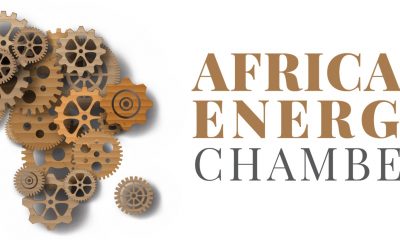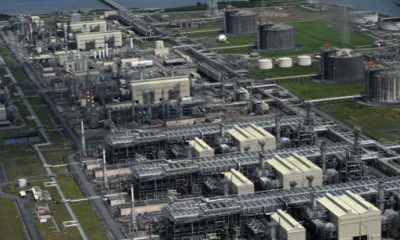Oil and Gas
The Impact Of Covid-19 On Africa’s Oil And Gas Industry: Africa’s Future And Leadership Beyond Oil

Refinery -Getty Images
The African continent is home to five of the top 30 oil–producing countries in the world. It accounts for more than 7.9 million barrels per day in 2019, which is about 9.6% of world output. However, the advent of COVID-19 in early 2020 has dramatically reduced oil prices. As a result, future levels of oil production in Africa and around the world is now uncertain as of June 2020.
The corona virus pandemic led to a total lockdown in most countries across Africa and a restriction in the movements of the citizens. And like every other sector of the economy, Oil and gas is greatly affected because, major oil companies like Shell Petroleum Development Company(SPDC), TOTAL etc. as well as smaller oil servicing firms cannot function. This has led to a decline in income and consumption expenditure for both companies and government of these countries because, the main contributor to Africa’s GDP in terms of exported goods is oil.
Worst still, with most countries’ boarders closed and all other means of transportation grounded, diminished trade helped revenue to drastically dropped, thus decreasing earnings from Foreign Direct Investment(FDI). The most devastating impact is the increasing rate of unemployment as even the crisis and the lockdown have led to the collapse of many small businesses and these set of people have no need for consumption of other fractions of crude oil such as petrol, kerosene etc.
However, the pertinent question for the African continent is how can we channel our developmental strategy to safeguard the continent future without over-dependence on oil? Can Africa succeed without depending on imported man-power to develop her resources?
As a continent blessed with a large quantity of natural resources including diamond, gold, iron, cobalt, uranium, copper, bauxite, silver, petroleum, cocoa beans, woods and tropical fruits etc., these resources remains undeveloped and forms potential for increased trade, industry development and a robust economy. African leaders must pay more attention to these other parts of the economy such as mining, manufacturing and large-scale mechanized farming and processed Agricultural products as this will go a long way to help increase the GDP of individual nation in particular and Africa as a whole.
Finally, the lesson from this pandemic is that African leadership need to do more for itself as we cannot continue to rely on external supplies from abroad. As we look forward to a brighter future, we must note that the world changes every day and for us to be a part of this growth, African leaders need to be dogged in advancing sectors like infrastructure, education, technology and energy.
Also Read: AfCFTA delay presents new opportunities for construction, manufacturing
Article: Tunde Ajala, Founding Executive at Dovewell Group
Visit Dovewell Group
Oil and Gas
Petroleum Industry Bill (PIB) Will Strengthen Nigeria’s Oil Industry

Petroleum Industry Bill (PIB) was introduced to the National Assembly in 2007 contrary to all Nigerians expectations the Bill, in its wholesale form, has survived three presidents and four convocations of the National Assembly but its passage will not sacrifice thoroughness on the altar of speed, because it will be in the nation’s best interest and we all believe this is the time to pass it.
Everyone has been waiting for the passing of the Petroleum Industrial Bill. This is the bill that is on the lips of every Nigerian whether he knows anything about petroleum or not and it is the most popular in the country.
Why it became the most popular because oil represents the live wire of our state and remains one of the most important pieces of legislations that the country needs. The passage of this very important piece of legislation will give room for meaningful progress to be made in the oil and gas industries in particular, and Nigeria in general.
Nigeria host the world’s 10th largest Petroleum reserve at about 25 billion barrels with Gas reserve of 166 Trillion Standard Cubic Feet (TSCF). It is indubitable that Nigeria with the largest reserve in Africa has significant untapped hydrocarbon potential available to advance her economic goal.
Before bill being forwarded to the National Assembly in 2007, Nigeria does not have a comprehensive law for the administration of the sector but has about 16 Petroleum Acts many of which overlapped in functions and responsibilities.
Even though a splinter Bill named the Petroleum Industry Governance Bill (PIGB), was passed in 2018 by the 8th National Assembly, failed to receive the prerequisite Assent of the President of Nigeria and thus could not become law.
Looking at the OPEC projection that by 2040 oil industry sector is going to be playing less and less a role in global energy usage. If the projection come true in the next 20 years from now the world’s dependence on oil would have reduced to 50 percent. So, whichever way you look at it, it appears that the days of oil are numbered. Regardless of this projection the nation oil and gas needs a comprehensive legislation that will help the country to generate more revenue because Nigeria has lost so much revenue that could have accrued to government coffers, as existing investments are stalled and potential investors are scared of coming.
Therefore PIB also seeks to address the problem of administering petroleum resources in line with global best practices, and to provide for efficient and independent sector regulation. PIB is also to promotes safe and efficient operation of the transportation and distribution infrastructure for the petroleum industry and the framework for developing third party access arrangements to petroleum infrastructure.
Bill have top priorities of Host Communities which seeks to protect and hasten the development of host communities. Section 234 to enhance peaceful and harmonious coexistence between licenses or lessees and host communities, and create a framework to support the development of host communities and foster sustainable prosperity within host communities. It also provides for direct social and the economic benefits from petroleum operations to host communities. Section 235 also provides for the incorporation of the Host Communities Development Trust. Once this PIB is passed and assented to by Mr. President, the present upheavals rearing theirs ugly heads within the host communities in the oil producing area and elsewhere will fizzle out and die a natural death.
PIB also seeks for the establishment of Downstream Petroleum Regulatory Agency (DPRA) aimed to regulate the downstream sector of the petroleum industry. Its functions include regulating the technical aspects of the downstream sector; regulating the commercial aspects of the industry as may be designated by the Minister; the issuance of downstream licenses to industry operators; and the facilitation of an enabling environment for investments in the downstream petroleum sector.
Henceforth the PIB also seeks for the commercialization of the Nigerian National Petroleum Corporation (NNPC) to become Nigerian National Petroleum Company Limited; the bill proposes that the NNPC Ltd will be incorporated under the Companies and Allied Matters Act by the minister of petroleum as the ownership of all shares in NNPC Ltd shall be vested in the government at incorporation and held by the Ministry of Finance incorporated on behalf of the government.
Section 53(5) says shares held by the government in NNPC Ltd are not transferable, including by way of sale, assignment, and mortgage or pledge unless approved by the government. Subsection 7 says, “NNPC Ltd and its subsidiaries shall conduct their affairs on a commercial basis without recourse to government funds. Section 55(4), however, says the cost of winding down the assets, interests and liabilities of NNPC shall be borne by the government.
Last year 9th National Assembly achieved a landmark when President Muhammadu Buhari has signed the Deep Offshore and Inland Basin Production Sharing Contract (PSC) Amendment Bill into law. The provisions of the Act stipulate that the law shall be subject to review to ensure that if the price of crude oil at any time exceeds $20 per barrel, the share of the revenue to the Nigerian government shall be adjusted under the PSC.
Finally Petroleum Industry Bill will create efficient and effective governing institutions, with clear and separate roles and to establish a framework for the creation of a commercially oriented and profit-driven national petroleum company in addition of promoting exploration and exploitation of petroleum resources in Nigeria for the benefit of the Nigerian people and the efficient, effective and sustainable development of the petroleum industry.
Written by: Abdullahi Gaya Wrote in from House of Representative Abuja
Oil and Gas
What will it take for 2020 to truly be the year of Gas in Nigeria?

NJ Ayuk, Executive Chairman of the African Energy Chamber
Naming 2020 the year of gas for Nigeria has a really nice ring to it, but marketing alone will not cut it.
JOHANNESBURG, South Africa, January 3, 2020 – “The Honorable Minister of State for Petroleum Resources, H.E. Chief Timipre Sylva has declared 2020 as the year of Gas for the Nation”, the news piece started. What amazing news! And certainly long overdue. As it seems, Nigerian officials have finally taken the cue. As I have said ever so often, more than an oil nation, Nigeria is a gas nation. It just doesn’t act like it.
Undoubtedly, natural gas has the enormous potential to diversify and grow the Nigerian economy, power its industries and homes, produce ever-so-lacking wealth, create jobs, develop associated industries in the petrochemical sector, raise people out of poverty, the list goes on.
Mr. Sylva’s demonstrated intent could perhaps become the most relevant political action anyone has taken in Nigeria in years and could change the country forever; and yet, the work ahead is so vast, we can only hope he has the strength to pull it off.
To be sure, naming 2020 the year of gas for Nigeria has a really nice ring to it, but marketing alone will not cut it. Concerted governmental action is essential if we are to see true growth in the liquefied petroleum gas (LPG) sector, and first of all, we need to see a conclusion to the long delayed Nigerian Gas Flare Commercialisation Programme. Sylva stated that this was his main priority, so let’s hope it happens soon.
Once the programme is cleared, oil producers will have a more conclusive alternative to flaring. They will be able to monetize a resource that has so far been wasted, but still that will not suffice.
The flaring issue in Nigeria is tremendous. Every year, 2 million tonnes of LPG are flared, instead of being used as a source of power or feedstock. That means millions of dollars literally going up in smoke. Nigeria’s zero-flaring programme has been on-going for years, and yet, the Nigerian National Petroleum Corporation (NNPC) has just released results that indicate that gas flaring has been consistently increasing over time. More specifically, “a total of 276.04 billion cubic feet (bcf) of natural gas was flared from Nigeria’s oil fields between September 2018 and September 2019”.
Further, NNPC stated that “the volume of gas flared within this period was more than what was supplied to power generation companies for electricity production which was 275.31bcf”. This is taking place in a country where 45% of the population does not have access to electricity, besides the extremely detrimental effect that has on businesses ability to compete and the extraordinary environmental damage that represents.
Already, the federal government announced in August that it would not be able to fulfill its Zero Routine Flaring target by 2020 and is yet to provide a new deadline for this goal to be achieved.
The problem remains the same as ever. It is much, much cheaper for producers to flare up and pay the fines than do anything about it. This can not continue to be. Stronger action is needed and it falls on Mr. Sylva’s leadership to see it done.
I don’t mean by this to point the finger at oil producers. Most would probably want to monetize that resource, and would if they could. But we lack legislation, infrastructure, pricing regulations, and actors ready to receive the feedstock. They can’t just pipe the gas somewhere and hope for the best. We need to focus on deepening domestic gas penetration and promote adoption amongst the population, foster the development of gas associated industries like ammonia and urea plants, use this resource for power generation, etc. Demand doesn’t grow out of nowhere.
For this to workout, everybody needs to work together. That means the ministry and the NNPC need to partner with the international oil companies, the indigenous oil companies as well as with the country’s financial institutions to create the solutions that can make this industry flourish. That is a tall job, but an essential one.
Of course, the news that the output of liquefied natural gas (LNG) coming from the Bonny LNG-plant is going to expand by 35% once the 7th LNG train is operational is fantastic. Nigeria will strengthen its position as one of the world’s biggest LNG exporters and that will bring considerable wealth for the country, but its people continue to be in the dark.
And LNG expansion projects are something IOCs are well prepared to do, but there are other important roles in boosting the gas industry that have to be taken by others.
Also Read: Interview: African Energy Chamber Executive Chairman, NJ Ayuk on Transforming Africa’s Energy Sector
I speak of course of marginal field development, a topic that is of fundamental importance to me and that I have extensively covered in my most recent book Billions at Play: The Future of African Oil and Doing Deals. Both for oil and gas, Nigeria’s marginal field development programme showed incredible promise when it was first launched in 2013. It gave opportunities to local companies to explore smaller discoveries that were uninteresting for the majors, which in turn allowed them to gain experience in leading exploration and production projects on their own. Further, it opened opportunities for domestic use of natural gas for power generation. That programme is now being copied by Angola, and yet, it has stalled in Nigeria.
Further, as I have extensively debated over the years, and most extensively in Billions at Play, we need to dramatically invest in Nigeria’s ability to negotiate and manage contracts. This applies both to the need to respect the sanctity of contracts, a fundamental part of giving international investors the confidence to trust that what they sign for will be respected, but also learning to choose who to sign contracts with.
The current debacle with P&ID, an unknown little company that has managed to sue the Nigerian government for breach of contract in the English courts and is seeking USD$9.6 billion in compensation, is an incomprehensible situation that should never have taken place. We need to know who our partners are and who we should be signing contracts with, and then stick by them.
Only by combining the role of the majors, the indigenous companies, the necessary infrastructure development for gas transportation, bridging with the nation’s banks to help finance projects and by giving a clear legal framework to the sector, can we hope to succeed. I do not doubt that this is possible to accomplish in 2020 and the years to come, but coming from the experience of recent years, it does not seem probable, and no one pays the price for that more than everyday Nigerians, that continue to fail to benefit from its country’s resources.
Action is necessary as a matter of urgency.
This week it was disclosed that international oil and gas companies were holding back an estimated USD$58.4 billion in investments in oil and gas projects in Nigeria because of regulatory uncertainty. Foreign Direct Investment in Nigeria was USD$1.9 billion in 2018. It’s not like we don’t need the money.
But how can we expect international oil companies to feel comfortable signing off on billions in investment if after 20-plus years of negotiations we still haven’t managed to settle on the Petroleum Industry Bill that will oversee the sector? Who can blame them for waiting to see what happens? They are waiting for us to figure out how we want to regulate the industry, and after 20 years, we still don’t seem to know. That has to change, and soon.
Nigeria has an estimated 200 trillion cubic feet of gas reserves. It is high-time to put them to use. With the right policies we could change the face of the country completely. We could give light to our people, we could power our industries, releasing them from the handicapping dependency on diesel generators that make it all but impossible for them to be competitive, we could relinquish ourselves from our dependency on imported fuel for power and heat, we could create new opportunities for job creation and industrial development, we could take millions of people out of poverty…
Further, strong domestic gas and gas-based industries could help boost intra-African trade, create new synergies with our neighbours, boost integration of power generation networks, establish new partnerships, even contribute to peace.
What I am saying, I say as an African, and it applies to many countries across the continent. However, Nigeria is in a prime position to truly enact change and be a beacon to others by showing leadership and resolve. It is the continent’s biggest economy and has the continent’s biggest reserves of hydrocarbons, both oil and gas. NNPC already works with some of the best major IOCs and the country has Africa’s best and most developed indigenous exploration and production capabilities. Let’s give ourselves the opportunity to be better and to live better, by taking advantage of the resources we already possess.
Mr. Sylva is showing leadership and drive. So far, he has proven himself to be the leader that Nigeria needs to develop new LPG and LNG industries that will take the country to the next level of development, not only economically speaking, but socially, environmentally, humanly. So let’s hope he can pull through the great transformations that need to occur for 2020 to truly be Nigeria’s year of gas.
By: NJ Ayuk is the Executive Chairman of the African Energy Chamber and author of Amazon best-selling book, Billions at Play: The Future of African Energy and Doing Deals.
Oil and Gas
The Nigerian CABOTAGE ACT and the Oil & Gas Industry: Issues and Policy Recommendations

Considering the main drives of the Nigerian economy, the oil and gas sector has strongly accounted for almost 90 per cent of the foreign exchange earnings. In fact, Nigeria primarily exports crude oil and imports refined petroleum products. However, the mobility and transportation processes of both the exportation crude oil and the importation of the refined products are largely dominated by major international shipping and maritime companies. This process contradicts a section of the CABOTAGE Act of 2003;
PART n.-RESTRICTION OF VESSELS IN DOMESTIC COASTAL TRADE
3. A vessel other than a vessel wholly owned and manned by a Nigerian citizen,Built and registered in Nigeria shall not engage in the domestic coastal carriage or Cargo and passengers within the Coastal, Territorial, Inland Waters, Island or any Point within the waters of the Exclusive Economic Zone of’ Nigeria,
Coastal and Inland Shipping (CABOTAGE Act, 2003 p A79)
It is well documented that, Nigerian National Petroleum Corporation (NNPC) trades the country’s Crude Oil on a cost and freight basis (CFB). This implies that, the NNPC is the total authority charge of the transportation of Crude Oil to the prospective buyers and none of these shipments are been carried out by any of the indigenous shipping companies. Furthermore, the economic implications demonstrate depicts that, Nigeria loses an additional 10 per cent of the country’s revenue to international freighting of its oil and gas. This amounts to the sum of $6.57 (USD) billion annually.
The history of foreign shipping corporation within the Nigerian maritime sector dates back to the 19th Century when steam engine boats were in use to move people and loads of agricultural products such as cotton, timber, and cocoa from Nigeria to other parts of the world.
In the late 1980s, the United States of America Congress moved to protect their domestic maritime industry by amending existing maritime laws. This was due to the restructuring bill of the maritime sector that proposed asking the government to strategically expand the concept of the country’s maritime regulations (Jones Act, 1920) to significantly redefine the perception of the then existing maritime laws.
This was also proposed in order to restructure and abolish the unfriendly foreign competition/participation within the US maritime industry. Moreover, this proposal was strategically embraced by Congress and has increased the level of productivity, recognition and profitability of the US maritime industry on a global scale.
The introduction of the CABOTAGE Act of 2003 within the Nigerian maritime sector was aimed at preserving the Nigerian costal shipping area for local maritime companies. The primary goal of this Act was to reserve the commercial transportation of goods, products and service within Nigerian coastal and inland waterways to vessels flying Nigerian flag and owned by people with Nigerian citizenship.
In fact, the CABOTAGE Act and the Local Content Act were adopted by the Nigerian maritime industry to empower the indigenous shipping companies to increase their involvement in the exportation and transportation of crude oil and the importation of refined petroleum products for economic development.
However, the Nigerian CABOTAGE regime is yet to produce an effective solution to the problems being faced by the maritime crude oil and gas transportation industry in Nigeria since the introduction of the CABOTAGE Act in 2003. These problems can be related to the inadequate understanding of basic requirements of the CABOTAGE Act by the regulators and the governmental will power of implementing the CABOTAGE regime can also be seen as a major problem.
Due to the weak implementation of the CABOTAGE regulatory Act by the Nigerian maritime sector and the federal government, this has led to an annual loss of over $6 billion US dollars to foreign maritime operators due to the lack of indigenous participation in the maritime transport system.
This implies that, the lack of strong implementation of the CABOTAGE regime has made the indigenous maritime operators to be unable to attain their full potential. A 2017 report of the National Bureau of Statistics/Nigerian Ports Authority (NPA) opined that, the ship traffic statistics around the Nigerian ports projected that a total number of 19,833 vessels berthed at the various ports between 2013 and 2016.
Similarly, 543,842,425 tonnages were registered within the period under review. The repost shows that 98 per cent of freights are been carried out by foreign shipping companies. This confirms the outrageous involvement and participation of foreign shipping vessels within Nigerian territorial waters.
One of the most effective strategies for promoting and protecting the Nigerian maritime industry is to prohibit the 100 per cent intervention of foreign vessels from participating in domestic coastal or ‘CABOTAGE’ shipping. In addition, this supports the primary motives behind the CABOTAGE Act.
Secondly, the government must implement and encourage a high level of maritime protectionism.
Thirdly, the involvement of local shipping participants which helps contribute to the Nigerian maritime sector must be given serious consideration and implementation by the government.
In view of all these recommendations, if the CABOTAGE Act of 2003 is effectively implemented within the maritime sector; Nigeria will be able to maintain jobs and skills in an industry which will be of meaningful importance to the economy. This will significantly contribute to the economic GDP of the nation and possibly make unemployment a thing of the past if effectively implemented.
Another workable strategy for the Nigerian maritime industry is building an effective regulatory structure for the industry, beyond the simple issues of making a technical design of the most appropriate regulatory instruments. For instance, a constructive legal framework, which will entail well-structured regulatory institutions, and a proactive regulatory institution.
In other words, having a well-structured implementation strategy in place will enhance the positive control of any regularity outcome within the maritime industry.
In conclusion, the key solutions to strengthening the CABOTAGE Act include inter alia: the significant involvement of the Nigerian Ship Owners Association of Nigeria (NISA), Ship Owners Association of Nigeria (SOAN) and other stakeholder in the official consultation process of granting waivers “Cabotage Vessels Finance Fund” (CVFF) to shipping firms, effecting the full implementation of the Cabotage Act within the maritime industry, resolution of CABOTAGE dispute between both the SOAN group and foreign shipping company.
Author

Dr. Akinseye Olatokunbo Aluko,
Deputy Programme Leader in Oil and Gas Management
University of East London, Stratford, London, United Kingdom.
-

 Afripreneur2 days ago
Afripreneur2 days agoMeet Datari Ladejo, the digital strategist helping brands thrive in the digital economy
-

 Afripreneur7 hours ago
Afripreneur7 hours agoCreativity, Data, and Innovation: Tutu Adetunmbi’s Vision for Africa’s Marketing Future with Stamfordham
-

 Press Release1 day ago
Press Release1 day agoThe 234 Venture Vault Launches Tech Startups and Talents Hunt Across Nigerian Tertiary Institutions
-

 Afripreneur7 hours ago
Afripreneur7 hours agoMeet Nzinga B. Mboup, a Senegalese architect committed to climate-friendly construction for African cities















